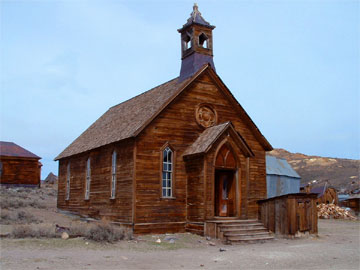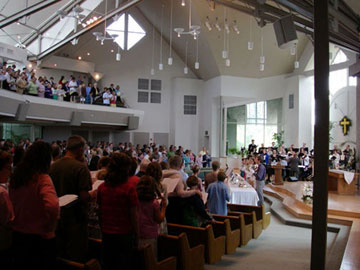A recent front-page story in USA Today caught my eye: “Survey: 72% of Millennials ‘more spiritual than religious.’” According to a survey produced by LifeWay Christian Resources, the vast majority of 18-to-29-year-olds are “really more spiritual than religious.”
There is more bad news for those of us who care about the future of Christianity, such as:
- 65% of Millennials who call themselves Christian are Christian in name only.
- 65% of Millennials rarely or never pray with others.
- 65% rarely or never attend worship services
- 67% don’t read the Bible or sacred texts.
 These results are more or less in line with a study produced several months ago by the Pew Forum on Religion & Public Life. “Religion in the Millennial Generation” found that fewer Millenials are attending worship services or identifying with religious groups. (Photo: A deserted church in Bodie, California)
These results are more or less in line with a study produced several months ago by the Pew Forum on Religion & Public Life. “Religion in the Millennial Generation” found that fewer Millenials are attending worship services or identifying with religious groups. (Photo: A deserted church in Bodie, California)
However, the Pew study found that Millennials are not that much different from earlier generations. For example:
- 40% of Millennials say that religion is important in their lives (compared to 39% of Boomers at the same ages)
- 41% of Millennials pray daily (like 42% of Gen Xers as young adults)
- 53% are “certain God exists” (compared to 55% of Gen Xers)
So, there is clearly a drift of younger folk away from religious involvement, but the picture is not as bleak as it might seem from the press reports of the LifeWay study.
An impressive, thorough investigation of the religious life of young adults can be found in the research of sociologist Christian Smith. Souls in Transition: The Religious and Spiritual Lives of Emerging Adults, published in September 2009, is an in-depth study of the religious life of people aged 18-23. Smith shows that the emerging adults of this generation are not substantially less religious than adults of previous generations. Moreover, he provides a much more nuanced picture of the religious life of young adults. In general, those from conservative religious backgrounds continue to believe and practice their faith, while those from more liberal and mainline traditions do not. I can’t begin to adequately summarize Smith’s 368 pages in one paragraph. But if you’re truly interested in the religious life of young adults, I’d encourage you to read his fine book.
Has the church lost the younger generation? No. But does is the church in danger of losing touch with younger folk? Absolutely. We have much to learn from those who are studying Millennials, including their faith and practice. We who are older Christians will never be able to reach those who are younger until we know what they’re thinking and feeling. Thus, I’m grateful to the folks at Lifeway and Pew, and to scholars such as Christian Smith. They’re sounding a wake up call for the church.

